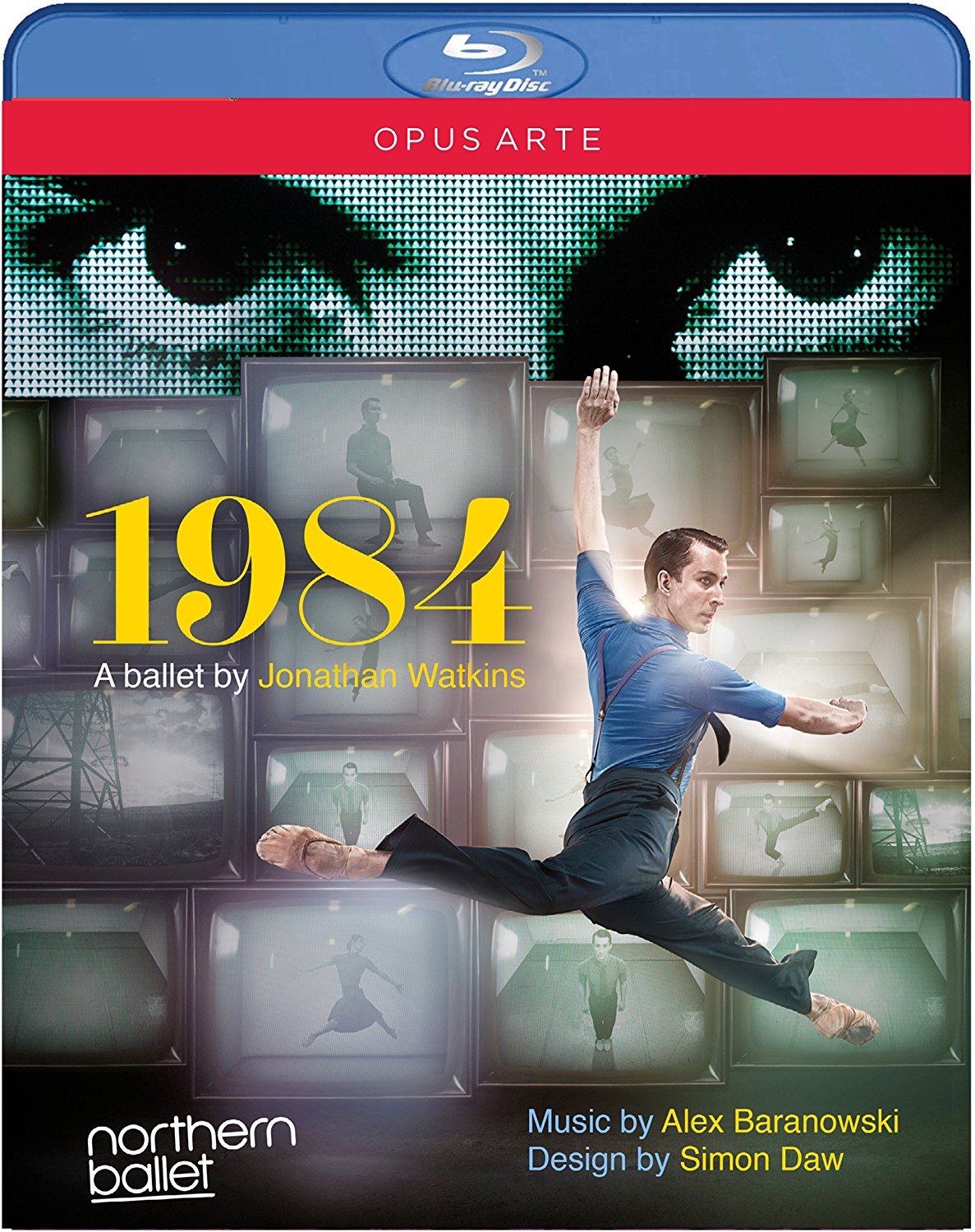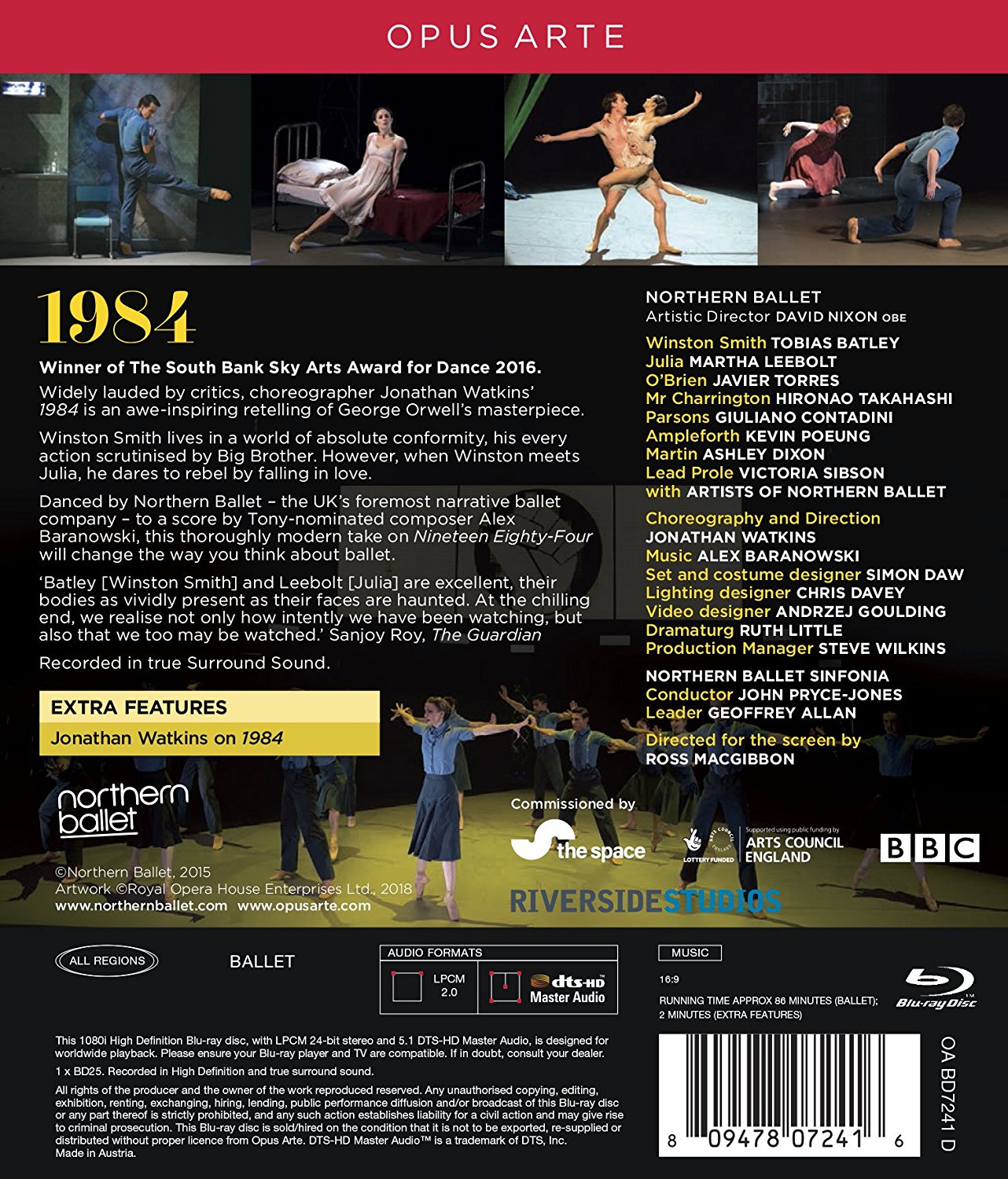

1984 ballet. Music by Alex Baranowski. Based on the novel 1984 by George Orwell. Directed and choreographed 2015 by Johnathan Watkins at the Northern Ballet in Leeds, England. Stars Tobias Batley (Winston Smith), Martha Leebolt (Julia), Javier Torres (O'Brien), Hironao Takahashi (Mr. Charrington), Giuliano Contadini (Parsons), Kevin Poeung (Ampleforth), Ashley Dixon (Martin), Victoria Sibson (Lead Prole), and other artists from the Northern Ballet. John Pryce-Jones conducts the Northern Ballet Sinfonia (Leader Geoffrey Allan). Set and costume design by Simon Daw; lighting by Chris Davey; video designs by Andrzej Goulding; dramaturgy by Ruth Little; production management by Steve Wilkins. Directed for TV by Ross MacGibbon. Released 2018, disc has 5.1 dts-HD Master Audio sound. Grade: B
The novel 1984 was published in 1948 as a political/philosophical/science-fiction screed warning the world about dangers inherent in industrial economies and especially totalitarian surveillance states. Most of the elements of the police state described by Orwell were taken directly from conditions in Communist countries at the end of WWII. The famous Big Brother character was inspired, of course, by the portraits of Stalin seen everywhere then in Russia (and today of Kim Jong Un in North Korea). But even if there are fewer police states now than Orwell feared might come, 1984 is still admired for its analysis of the roles of militarism and "double-think" in modern economies.
The book 1984 is full of shocking details about feared future conditions, oddly-damaged characters, and long explications of political theory, none of which lends itself well to expression in dance without words. The best the choreographer can do is to hit the high points and try to create a mood.
The people we see in the screenshot below are members of the Outer Party who work (in the future year 1984) in the administration of the State of Oceania. The Outer Party members are subservient to the Inner Party, led by Big Brother. Living in a highly regimented and impoverished society under constant surveillance by the Thought Police, Outer Party folks are all both perpetrators and victims of the police state. Their rank is obvious from their cheap "blue-collar" style uniforms. The work unit seen below is in the Ministry of Truth. Their job is to constantly falsify all the written records of the nation to conform to the latest lies propagated by Big Brother. Their grim poverty is necessary because Oceania is constantly at war with several other giant police states. The big screen below is for propaganda; the small screens are cameras sending images constantly back to the Thought Police:
Inner Party members comprise about 2% and Outer Party members about 13% of the population. The remaining 85% of the population are the proles (from proletariat), who live much less regimented but even more impoverished lives than the Outer Party members. Below meet anti-hero Winston Smith (Tobias Batley) who, after years of work in the Ministry of Truth, has lost faith in Big Brother. He sometimes visits a prole area to find a prostitute or try to buy something on the black market. He even bought a blank book in a junk shop and started a diary (a capital offense). Here he buys a beautiful old paperweight. Owning an artifact of beauty isn't exactly illegal---but it could easily suggest to the Thought Police a forbidden independence of judgment:
Winston is starting to have other dangerous thoughts. He has been watching Julie (Martha Leebolt) in the cafeteria where all the Outer Party members eat their artificial-food meals and stay half drunk on cheap gin. She's wearing her red Junior Anti-Sex League belt. Julie has perfected the art of appearing chase while in fact she is promiscuous, but only with older Outer Party men that she identifies as safe:
Big Brother allows sex only for procreation by married Party members. All other sexual energy is to be bottled up and released by Party members at various Hate events. Below is a Two Minutes Hate where the workers engage in orgiastic expressions of anger at enemies of Big Brother:
Gradually Winston embarks on a forbidden affair with Julia. Eventually they truly fall in love, but marriage is not feasible because Winston has a wife who drifted away years ago:
Winston become convinced there are other Party members who share his rebellious feelings. Below he and Julia join with a member of the Inner Party named O'Brien (Javier Torres ) in a meeting of the Brotherhood, a shadowy group formed to resist Big Brother:
But just when Winston thinks he has something good figured out, he learns how mistaken he was:
O'Brien turned out to be an agent of the Thought Police. With unlimited resources for brainwashing and torture, he quickly breaks Julia's spirit, and she immediately betrays her lover. Winston resists heroically, expecting to be killed in revenge. But O'Brien explains that Big Brother makes no martyrs---anyone who strays will not be allowed to die until he first has learned to love Big Brother. (Watkins puts Julia on the stage in several ways that might suggest that Julia was also an accomplice of the Thought Police from the beginning. But this is not countenanced in Orwell's text. Julia was just a girl who liked to do what girls do best and had no interest in politics.)
Orwell set his novel 36 years in the future from the date it was published. Well, 1984 has come and 34 years have passed since then. The political aspects of the book now seem obsolete with only a few clearly totalitarian states now active in the world such as China and North Korea. Also, Orwell's scientific predictions were not hugely impressive. But his main admonition is still valid---we have to remain alert to the dangers inherent in the future development of government and science. Big Brother is out there appearing in unexpected new ways. Now, if I make an inquiry on the Internet about a refrigerator, then for weeks my desktop PC will stalk me with advertisements for kitchen appliances. I have been seduced into bringing Big Bother into my home! And now we are learning that foreign actors have attempted through the Internet to influence events and opinions in the United States by spreading false news among our citizens and even trying to tamper with elections.
Orwell's ideas about misuse of the military by those in charge of the modern industrial state still need our attention. But above all, he calls still for us to beware of "double-speak" in matters such as the following (using the USA as an example):
The USA is a peace-loving country. (Then why have we been been, at least to my memory, almost continuously involved in foreign hostilities since I stood in 1963 about 10 miles from then Communist East Germany defending Europe from the Russians.)
Anyone in the United States can make it to the top. That may be possible for individuals of rare talent and ability. But in fact, the top 10% of the population in the US now owns 80% of the wealth. The bottom 90% own 20% of the wealth, and their children are shut out of most opportunities (Stewart, Matthew. "The Birth of a New American Aristocracy." The Atlantic. June 2018, pp 48-63.)
The United States has the best medicine in the would. Then why is infant mortality higher than other modern countries and why is life expectancy dropping?
We have the best higher education! But doesn't higher education now really function as a pre-country club for the top 10% (and, if needed, a haven for draft-dodgers). And aren't we supporting the country clubs on the backs of students from the bottom 90% who become indentured servants through student loans (that can't be discharged in bankruptcy if the country-club degree turns out to be worthless).
It was not easy to express Orwell's many ideas about the future in an 86-minute dance libretto. But Jonathan Watkins came up with a sensible distillation of the mood of the novel. The music from Alex Baranowski is surprisingly melodic and pleasant considering the darkness of the plot. The corps gets a good workout in novel dance patterns. The principal dancers are all pretty good actors. The sets, costumes, props, and special futuristic effects are effective.
We did a Ballet Wonk Worksheet. The pace is 8.4 seconds per clip and 59% of the clips are full-body shots, which is mediocre by our standards for good ballet video (even though the scene of the lovers in the woods is terrific). The result, while workman-like rather than spectacular, is interesting enough especially if you are familiar with the novel and its messages. Maybe in the future people will see this ballet first and then be inspired to read the book. Most of the press critics seem to give this 4 out of 5 stars, and we will follow suit with a B.
Here is a clip from the Northern Ballet:
OR









